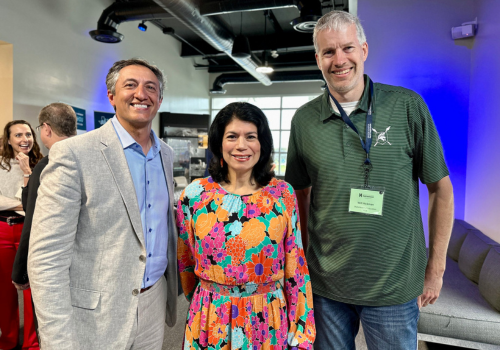Legislative Update: Bills Filed on the Digital Divide and Energy Competitiveness
Published Jan 29, 2021 by Taylor Landin
During a slow week in Austin, the Senate discussed COVID-19 vaccine distribution and two bills were filed with the potential to impact the Partnership’s Executive Priorities on bridging the digital divide and increasing our energy competitiveness.
WEEKLY FLOOR ACTIVITY
Senate Floor Discussion Addresses COVID Vaccine Distribution
The issue of vaccine distribution is front and center for most Texans at the moment and the Texas Senate was no different. Senators received an update on the state’s vaccine distribution efforts and made appeals to refine the current vaccination plan to enhance vaccination rates within higher-risk and minority communities, to improve vaccine access, and to increase coordination with local leaders.
Senator Lois Kolkhorst (R-Brenham), Chair of the Senate Health and Human Services Committee and member of the state’s Expert Vaccination Allocation Panel, provided an update on the state’s vaccine distribution efforts. Kolkhorst said Texas receives 1.2 million doses of the vaccine monthly and vaccinates approximately 330,000 Texans per week. She also noted centralized large vaccination sites are experiencing high call volumes for appointments and issues with the online registration portal. This comes at a time when Texans receiving their first vaccination will require a second dose in a few weeks’ time.
Lieutenant Governor Dan Patrick reiterated the need for a system that provides a level of transparency and certainty to Texans seeking vaccine appointments, noting: “We’re all in this together, trying to the get the vaccination out to as many people as quickly as possible.”
KEY BILL FILINGS
Digital Connectivity
Representative Trent Ashby (R-Lufkin) filed House Bill 1446, an omnibus broadband connectivity bill. The legislation would establish a Broadband Development Office charged with developing and implementing high-speed internet connectivity statewide and reporting to the State Comptroller. State leaders from across the political spectrum have publicly recognized the need for digital access, and this legislation is an important step. The Partnership is leading the Digital Texas Coalition bringing together organizations throughout the state to ensure Texans realize the benefits of a twenty-first century digital network.
Carbon Capture Technology
Key legislation was introduced in both the House and Senate by Representative Chris Paddie (R-Marshall) and Senator Kelly Hancock (R-North Richland Hills), respectively, to direct the Texas Railroad Commission to take on the sole responsibility of oversight and approval of geologic sequestration of carbon dioxide in Texas.
House Bill 1284 and Senate Bill 450 direct the Railroad Commission to seek primary enforcement authority (primacy) from the EPA over these sequestration sites, so as to regularly expedite their review and approval.
Texas lacking primacy for geologic sequestration is seen as a key obstacle in advancing Carbon Capture, Use and Storage (CCUS) in the state, given the abundance of possible sites within state-owned lands particularly in the Houston region, along the Gulf Coast, and offshore. Currently, North Dakota and Wyoming are the only two states that have this authority, and Louisiana is in the process of applying. To maintain our competitive advantage in the development of CCUS, advance the region’s energy transition goals, and accelerate the already lengthy federal permitting timelines, it’s important for the Legislature to act this session.
To learn more about this week of the 87th Texas Legislative Session or the Partnership's priorities, check out Houston.org/txlege.
Get the latest on mental health policy and the impact on the workforce in the Partnership's Future of Texas - Unscripted.
 The Houston Report
The Houston Report





















